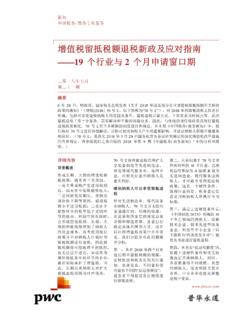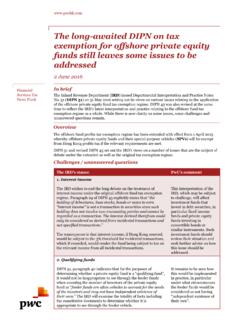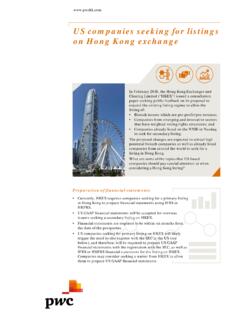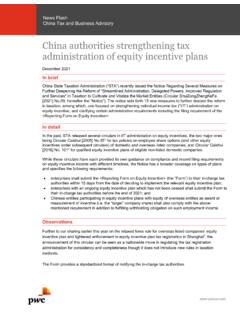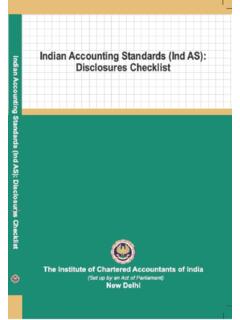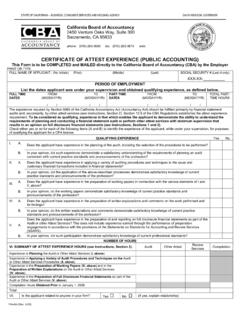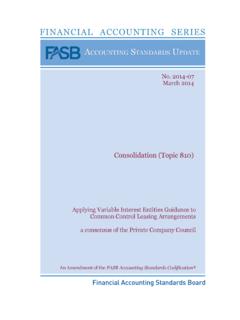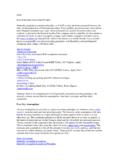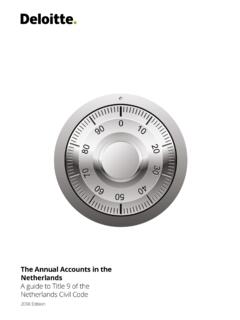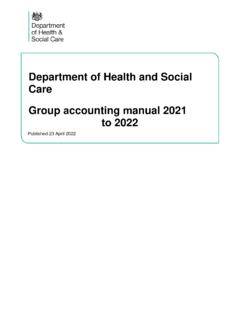Transcription of Accounting and reporting
1 146 Doing business and investing in China Accounting and reportingAccounting and reporting 147 Observations1. There are currently two Accounting regulation systems in China, ASBE1 and CAS CAS 2006 is substantively converged with IFRS,3 and ultimately, will be adopted by all companies (except for small enterprises that elect to adopt A SBE).2. Even if the functional currency is not renminbi, your company in China will still need to present one set of financial statements in renminbi for statutory Make sure you have at least a general understanding of the differences among ASBE, CAS 2006 and IFRS, and their different impacts on the financial positions and results.
2 Ensure your companies in China select an appropriate Accounting regulation system to Tax regulations require that companies make necessary adjustments to their Accounting profits to arrive at their taxable profits. With the issuance of CAS 2006, there would be even more differences between Accounting books and tax Pay attention to the Accounting year in China which must be from 1 January to 31 December and may not be the same as your group s reporting Ensure your local Accounting profit is appropriately adjusted to the taxable profit in the tax return in accordance with the tax The Accounting System for Business Enterprises, 16 specific Accounting standards and other related Accounting regulations2.
3 The Accounting standards for Business Enterprises (2006) and other related Accounting regulations (referred to informally as the China Accounting standards 2006, or CAS 2006)3. The International Financial reporting Standards148 Doing business and investing in China Introduction to books and recordsThe Accounting Law defines the roles of the governmental departments on Accounting matters and specifies the fundamental requirements of Accounting practice, Accounting procedures and Accounting supervision. The Accounting Law empowers the department of finance under the State Council, , the Ministry of Finance (MoF), to administer nationwide Accounting matters, including the promulgation of uniform Accounting regulations/ Accounting standards that must be complied with throughout the country by all the applicable China, your companies are required to maintain Accounting records and prepare annual financial statements in accordance with the Accounting regulations/ Accounting standards issued by MoF.
4 The Accounting Law stipulates that companies must keep three kinds of primary Accounting records: journals, a general ledger and sub-ledgers, as well as appropriate supplementary memorandum records. Computerised Accounting systems, if used, can be regarded as the company s Accounting Accounting regulation systemsAt the moment, there are two parallel Accounting regulation systems, both issued by MoF:1. The Accounting System for Business Enterprises, 16 specific Accounting standards and other related Accounting regulations (ASBE), and2.
5 The Accounting standards for Business Enterprises (2006) and other related Accounting regulations (CAS 2006).ASBEASBE is effective from 1 January 2001 and is applicable to all types of companies, until certain types of companies are required to, or those companies have volunteered to adopt CAS 2006 from 1 January 2007 or thereafter, , all listed companies are required to adopt CAS 2006 from 1 January 2007. ASBE comprises the Accounting System for Business Enterprises, 16 specific Accounting standards and other related Accounting regulations.
6 The Accounting System for Business Enterprises sets out the Accounting treatments for major line items in financial statements, in the order of assets, liabilities, equity, income, expenses Accounting documents, books and financial statements prepared by a company must be written in Chinese. They can also be written concurrently in a foreign language. Companies are required to keep Accounting records, financial statements and supplementary memoranda for at least 15 16 specific Accounting standards include:1. Inventories2.
7 Fixed assets3. Intangible assets4. Investments5. Borrowing costs6. Debt restructurings7. Revenue8. Construction contracts9. Leases10. Exchange of non-monetary assets11. Contingencies12. Accounting policies, changes of Accounting estimates and correction of errors13. Cash flow statements14. Events after the balance sheet date15. Interim financial reporting16. Related-party disclosuresAccounting and reporting 149 However, these 16 specific Accounting standards themselves do not form a comprehensive basis of Accounting . They serve only as additional/supplementary Accounting requirements/guidance to the Accounting System for Business Enterprises.
8 Some of them are only applicable to the joint-stock the recognition and measurement principles under ASBE are largely in line with those under International Financial reporting standards (IFRS), there are major differences in a number of areas. Here are some examples: Fair value measurement is not allowed Recognition of deferred tax is not mandatory The concepts of financial instruments and share-based payments are not introduced Preparation of consolidated financial statements is not mandatory for non-listed companiesCAS 2006 CAS 2006 was issued by MoF on 15 February 2006.
9 It forms a comprehensive basis of Accounting and is seen as substantively converged with the IFRS. CAS 2006 is effective from 1 January 2007 for all listed companies and becomes effective for companies such as financial institutions and large and medium-size state-owned enterprises in the following years as required by the various many provinces and cities, certain other types of companies may also have already been required by the local finance authorities to adopt CAS 2006. Eventually, CAS 2006 will be the only basis of financial reporting for all types of business enterprises, except those small enterprises that are qualified to adopt the Accounting standards for Small Enterprises (see also Accounting standards for Small Enterprises later in this chapter).
10 For those companies that have not yet adopted CAS 2006 (mainly non-listed foreign investment enterprises and privately owned enterprises), the mandatory adoption date is yet to be determined by MoF, though early adoption is of April 2012, CAS 2006 comprises one basic standard, 38 specific standards , application guidance for 32 specific standards , four interpretations and four yearly issued annual report guidance; that is, from 2008 to addition, the officials of the Accounting Regulatory Department of the MoF, who are responsible for drafting CAS 2006, have formed a team to compile a guidebook to CAS 2006, which is equivalent to the implementation guidance for IFRS.

